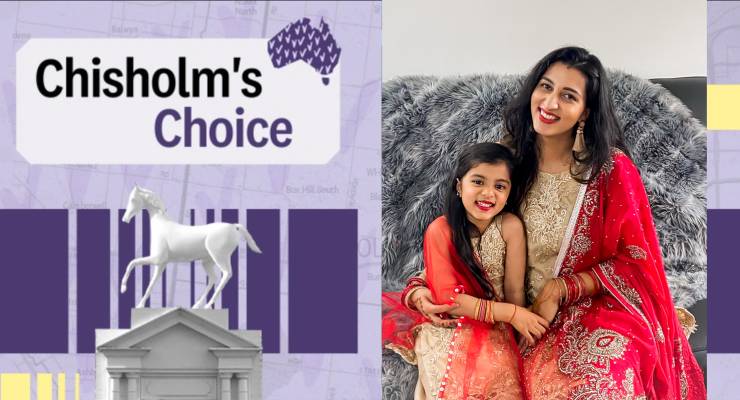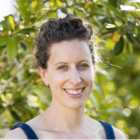
In this election series, Crikey teams up with the University of Melbourne’s Centre for Advancing Journalism to delve into the heart of federal marginal seat Chisholm, in south-east Melbourne, to see what people are thinking about in the lead-up to the poll. Find more of the series here.
Instead of posting about Indian curry nights, Mannie Kaur Verma wishes the prime minister — and Australian politicians generally — would engage with migrant communities in more meaningful, less tokenistic ways.
“You wouldn’t see him, for example, sitting with a group of young Indian students and saying: ‘How have you found your experience in Australia as a student? And what can we do to support you?’ ” she says. “I never see that on his Instagram or socials.”
An Indian-born Australian, Verma lives in Glen Waverley, a suburb in Melbourne’s south-east in the marginal seat of Chisholm. It’s a multi-generational household, home to Verma, her husband, their two children — a daughter in year one and a son in kindergarten — and her parents-in-law.
Like Verma, 4% of people living in Chisholm were born in India, double the national average. And more than half the electorate’s residents were born in another country, 2016 census data show.
Despite this, Verma says there’s little genuine engagement with migrant communities and their concerns by politicians.
“A shared view that a lot of migrants have is that people really only come to us and ask us questions around election times,” she says.
Morrison’s family curry nights have become a staple of his social media feeds and form part of his political persona. So much so that images have fed various conspiracy theories online, and Verma referenced them when she took him to task on Q+A, accusing his government of abandoning Australians of Indian heritage during the COVID crisis.
Verma regards the curry posts — or, say, politicians rocking up to temples for Hindu festivals — as insincere. She would rather see local candidates engaging with communities regularly — including outside election campaigns — and valuing the contribution migrants make to Australia.
“In the last two years with the students not coming, we’ve seen the difference in our economy. Literally every cafe, every restaurant is looking for workers. So we see the difference migrants make to the community — but I feel we’re just not valued,” she says.
As a lawyer, Verma knows the challenges many face, whether it’s the financial insecurity first-generation migrant women experience once they’ve put their careers on hold to raise children, the gaps in services for women facing domestic violence, or the lack of review rights for decisions under Australia’s migration policies.
She says a more affordable childcare system would go a long way towards addressing bigger issues like gender equality and domestic violence, particularly for first-generation migrant women.
“I’m really privileged and really blessed that I’ve got parents that live with us, and we’ve never had to really bear that expense,” she says. “But if it weren’t for them, trying to have a career as a woman while still trying to look after kids, it can be quite difficult.
“A lot of people I talk to, they often make the decision to put their careers on hold so they can look after kids because it’s more economical … As a result, you miss out on promotions, and you’re already behind.”
For many clients experiencing domestic violence, she says: “A lot of the time they don’t leave because they need the financial support of the second person earning in the house. A lot of the time these women haven’t been working because they’ve been looking after kids.”
As a Labor Party member, Verma wants migrants’ rights to be prioritised, and political parties to look at reforming what she says is an unfair and unjust migration system.
As well as being a practising lawyer, Verma recently completed a master’s degree thesis on politics and policy called “A Colourful Woman’s Place in Politics”.
She wants more women of colour to enter politics — particularly in winnable seats — but to succeed they’ll need supportive networks. It’s not enough for candidates to come from diverse backgrounds; representatives should bring compassion and authenticity.
She is encouraged by the approach Carina Garland has taken since being endorsed as the Labor candidate for Chisholm last year. She says Garland held many early consultations — initially on Zoom due to Melbourne’s COVID restrictions — inviting a diverse range of people, and seeking their advice on the best ways to connect with people in the electorate.
“We need someone who’s going to be relatable to us, who wants to go out and sort of connect with the community and find out what the issues are,” she says.








Sounds a bit masochistic!
Who would want to see more of any pollies?
“She would rather see local candidates engaging with communities regularly — including outside election campaigns — and valuing the contribution migrants make to Australia.”
Yes. This.
Question is, why don’t MPs liaise more with migrant communities, especially when the Victoria Liberals had it as a central policy, way back in the ’70s?
Started with Howard in the ’80s who disappeared ‘west’, later the word ‘multiculturalism’ from the PM’s Office, Tampa, imported nativism & libertarian policies, while Beazley allegedly demanded that Labor follow; supported in media by almost zero positive narratives round refugees, immigration or immigrants vs. constant white anting e.g. as an environmental ‘hygiene’ issue due to ‘population growth’.
The latter was an import of deceased US white nationalist John ‘passive eugenics’ Tanton, visitor & admirer of white Oz, member of fossil fueled ZPG, promoter of ‘the great replacement’, muse of Steve Bannon and the alt right; described by NYT a decade ago as ‘the most influential unknown man in America’ who network via Bannon advised Trump.
Fact is it was half smart electoral politics with Howard’s ageing Anglo-Irish electorates dominating above median age vote, especially in regions with antipathy towards post 1970’s ‘immigrants’ (wink wink), much dog whistling and support from media, indirectly Labor too (Minister of Sustainable Population -> eugenics); while society is now more diverse and educated, but our media and politics are decades behind society….
‘Started with Howard in the ’80s who disappeared ‘west’ not,’ but ‘wets’